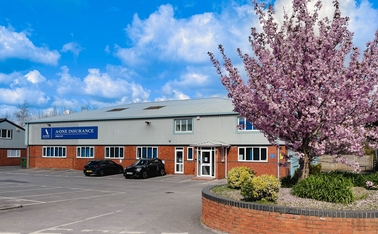
Roundtable: How can brokers blossom in the ever-evolving EV market?

The electric vehicle and hybrid market is set to grow exponentially in the next decade as UK motorists are encouraged to transition from internal combustion engines. Our expert panel and sponsor AX learn more.
According to the International Energy Agency, there were 11m electric vehicles on the world’s roads in 2020, and that number is expected to rise to 145m by 2030.
EVs are creating a range of changes as to how and why people access vehicles ,and this change in consumer demand is challenging the traditional models of insurance.
Delegates
James Allenby, Novo Insurance director
Alex Borgnis, LV head of motor underwriting
Leon Bosch, Partners & head of automotive
Tom Clarke, Abacai chief EV officer
Richard Daws, MNK Re director
Janine Freeman, AX head of e-Ventures
Barry Mamtora, Forum Insurance managing director
Nick Mohan , Jackson Lee Underwriting managing director
Steve Molloy, AX director of commercial sales
Matthew Porter, QBE head of technical and business performance for motor
Gerry Ross, Allianz head of commercial motor
Mike Wall, Markerstudy head of non-standard motor and home
Daniel West, Greenways business development director
What is currently stopping insurers from exploring the EV market?
▶ Allenby: We’ve been involved in insuring EVs since 2015. The biggest block for us, despite the awareness of the market, is the engagement and understanding from the underwriters. It has become incredibly frustrating. Talking to the big boys, they are still talking about the urban myths that were knocking about six or seven years ago.
▶ West: With the underwriters there is not the forthcoming proactiveness. It has taken the likes of Novo and ourselves who set up a specialist EV side to come and understand the market and work with insurers to produce something rather than insurers providing something. That is something that is blocking other brokers from getting more involved. It relies on us doing the legwork to understand EVs.
▶ Wall: Because the market has been relatively small the insurance companies haven’t really focused on it. While it has remained small scale, compared to the whole market, the world has got to catch up. We need experts to understand the product.
At the moment, from the underwriters, it is the fear of the unknown. They will go near it when they have to, when the market share is such that we have to do something.
Because the market has been relatively small the insurance companies haven’t really focused on it.”
Mike Wall
▶ Borgnis: There are lots of myths and legends around what EVs are, how people drive them, what they mean in terms of claims processes. When you’ve got a relatively small emerging market, there is always going to be a little bit of a challenge to get that to the top of the priority list in terms of building products, building underwriting knowledge, and building pricing regimes.
We are proud of what we have achieved, and we have chosen to do it. For an industry to actively choose it, that is the key.
▶ Ross: We did some research of our customers and 75% of fleet managers have already got EVs. We have had to adapt our products so we can cater for EVs, and it is not in our interest to have a different policy for EVs than for petrol vehicles.
We have brought those covers in. Most of the customers would hold their vehicles for three to four years, so we are only one or two lease cycles away from 2030, so we are cutting our nose off to spite our face if we don’t engage with this.
What are the unique challenges when it comes to EV cover?
▶ Mohan: The questions we are constantly asked are about motor insurance, about where do we go, how does it operate and what happens with charger cables – if I’ve got a cable on the street, how does the motoring policy respond when somebody trips over that cable? Or if you’ve got someone in the top block of flats, how does the motoring policy respond in those instances.
Having looked at the number of motoring insurance policies that say they are EV, it is kind of silent on those points and those are the points that a whole lot of people are asking about when they move to EVs.
▶ Mamtora: On the repairs side, the end user is concerned if there is going to be a replacement vehicle or not. That is another loop at the end of the chain, which needs to be linked up, and it is only when the insurers have approved garages that you will see a break in the chain because the publicity and the awareness will come back to the insurer.
▶ Borgnis: Although EVs have been around for a while, hopefully we recognise that EVs of three years ago are not the same car as an EV now. We also know that Mercedes are going to create some new challenges at the beginning of next year in terms of new autonomies on vehicles. This is a challenge we will face as an industry time and again in terms of how we respond to emerging customer demand, new forms of technology and how we actually learn to underwrite that and create products and policies that are right for our customers.
When you’ve got a relatively small emerging market, there is always going to be a little bit of a challenge to get that to the top of the priority list in terms of building products.”
Alex Borgnis
For me, it is a pace thing. How can we challenge ourselves to be quicker and more agile perhaps in frameworks where we might not always have been as quick to make changes in the market?
▶ Daws: The challenge for me is that mix of being proactive and reactive. The insurance market – from an underwriting perspective – for very good reasons right across the industry has to be reactive. Several brokers have tried to be proactive, and there is that disconnect between the two.
The current market propositions are built for three years ago, but with Covid and technology racing ahead, what we really need to be doing as an industry is looking three years into the future rather than three or four years behind.
Brokers that are looking that far ahead have built fantastic plans for themselves, but of course the challenge is with the risk carrying. We can build the best forward-plan in the world, but without a risk carrier behind them being prepared to come on that journey, we are never going to keep up with the development within the EV space.
The current market propositions are built for three years ago but with Covid and technology racing ahead, what we really need to be doing as an industry is looking three years into the future rather than three or four years behind.”
Richard Daws
What role can data play in the development of new products?
▶ Molloy: The underwriters are saying ‘if you want us to write this risk, we need data’ because they don’t have that confidence to do that presently – which is why they have come to us.
We have a fleet of EVs, and we have some data that is quite rich and we shared it with them, and have managed to build up confidence with some of the underwriters in order to underwrite [these vehicles]. But there is still that frustration, certainly on the retail aggregator side, that they are not competitive. They can write EV, but it is not at competitive prices.
▶ Bosch: You are having to change the whole underwriting mantra now. You are in an industry that is 300+ years old and has always been looking backwards to try to determine trends going forward and that’s all out the window now. Data is crucial as you have to change to real time underwriting, using the data available to try to predict what’s happening going forwards. You don’t have the years and years of back data to reflect on. It’s a bit of a culture change from an underwriting perspective as well.
▶ Allenby: There is a tremendous amount of data available coming out of these electronic vehicles. Can we use some of that data to supplement the lack of historical data? With some insurers we are now seeing that we are handling data a lot better than we used to. There is a lot more free data available from EVs. Some insurers are looking at EVs and saying this is the way to get telematics working across that mass user base rather than distressed and difficult sectors.
▶ Molloy: The vehicles are changing the driver behaviour. The data that is coming out of our telematics when customers are in our fleet cars; they are driving five to eight miles-per-hour slower than the equivalent ICE driver. They are a different risk.
Is a separate product needed to cover the EV market?
▶ West: In time, a standard car fleet policy will evolve, but at the moment there are certainly some needs of EV owners that are not covered.
We have worked with Renault Zoes and their owners for a number of years. In the early days, they came with a leased battery, which was a massive turn off for insurers to the point where they [either] wouldn’t cover the vehicle at all or they would cover the vehicle and not the battery.
There does need to be some element of specialist cover within the product.
▶ Allenby: It doesn’t need to be anything to dissimilar to what is currently there, but it needs to have some USPs attached to it which are specific to EV owners right now. In three to four years’ time, EVs will be known as cars.
▶ Porter: From an insurer perspective, it is just a normal car, and it is just making sure the cover is correct for that end user. And that is why I don’t think there is a need for a product. We deal in commercial fleets and most fleets now have an element of EV on there, even if it is just testing the water.
▶ Clarke: How many people drive an EV everyday? Does driving an EV, and living with an EV, everyday feel different to you and what you were doing before? The reason I ask that is you can look at all the research, but when we think about how we should design products, we should be going back to those consumer needs.
AA research last year showed that around 50% of people are worried about the trip liability, so are all insurers clear on that? I would argue that LV and DLG have done a great job on the direct proposition.
▶ Freeman: I just wanted to draw an interesting analogy with a change that has happened in the energy industry over the last decade or so, because when you look now at the energy suppliers, it is a totally different set of companies than it was 10 years ago. The ones that got on the front foot in terms of renewables and smart tariffs; they are now buying out the big boys. I feel there is a massive opportunity for everyone sat around this table.
Right now, it is a lucrative market. We have built a business and brand from it. Could we do a lot better? Yes, we could. There is a huge market out there which is growing every day but how do we capitalise on it?
James Allenby
How can insurers and broker seize the opportunities this shift presents?
▶ Allenby: Right now, it is a lucrative market. We have built a business and brand from it. Could we do a lot better? Yes, we could. There is a huge market out there which is growing everyday, but how do we capitalise on it?
I think in two years’ time there will be more products in the marketplace, and it will be slightly more mature. But there will be some insurers that will be having exactly the same conversation.
▶ Bosch: We still need to continue to be proactive and understand what the needs are so we can keep challenging where we need to.
EV is now the catalyst to a whole lot of other things. If you can’t access to the one you want, maybe you are going to subscribe to it. EVs is a whole raft of other areas, and insurers now need to consider how to adapt policies to what’s going to come after the EV adoption.
Only users who have a paid subscription or are part of a corporate subscription are able to print or copy content.
To access these options, along with all other subscription benefits, please contact info@insuranceage.co.uk.
You are currently unable to print this content. Please contact info@insuranceage.co.uk to find out more.
You are currently unable to copy this content. Please contact info@insuranceage.co.uk to find out more.
Copyright Infopro Digital Limited. All rights reserved.
You may share this content using our article tools. Printing this content is for the sole use of the Authorised User (named subscriber), as outlined in our terms and conditions - https://www.infopro-insight.com/terms-conditions/insight-subscriptions/
If you would like to purchase additional rights please email info@insuranceage.co.uk
Copyright Infopro Digital Limited. All rights reserved.
You may share this content using our article tools. Copying this content is for the sole use of the Authorised User (named subscriber), as outlined in our terms and conditions - https://www.infopro-insight.com/terms-conditions/insight-subscriptions/
If you would like to purchase additional rights please email info@insuranceage.co.uk








